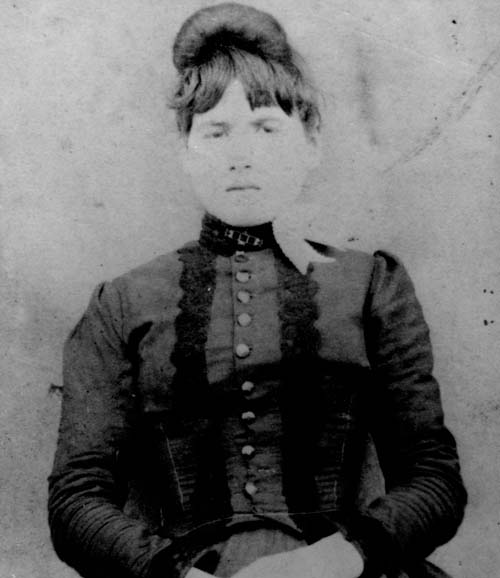In October 1896, Elva Zona Heaster (called Zona) married Erasmus (or Edward) Stribbling Trout Shue after a brief courtship. Zona was found dead in their home the following January. The family doctor recorded “childbirth” (presumably meaning miscarriage) as the cause of death. However, Zona’s mother, Mary Jane Heaster, was sure her daughter had been murdered by her new husband. Her proof? Zona told her so. After she died.
To be fair, the whole thing was a bit suspicious. A whirlwind romance and marriage to a near stranger, then a death within months. It turned out Shue had an ex-wife who accused him of abuse and a second wife who also died suddenly after marriage in an accident. Oh, and Shue was quite protective of Zona’s body, and would let no one examine her, especially the neck.
After Zona’s burial, Mrs. Heaster claimed she was visited four times by her daughter’s ghost, who said her husband had broken her neck in a rage over dinner being delayed.
It is, of course, possible that Mrs. Heaster made up the story to put pressure on the law to act. But even without the ghost’s account, prosecutor John Alfred Preston agreed there was enough reason to exhume the body and perform an autopsy, which showed that Zona did indeed have a broken neck and other signs of strangulation.
Shue was convicted based on this circumstantial evidence and not actually the ghost’s testimony. In fact, the prosecution didn’t raise the ghost (so to speak) because even if it were true, Zona’s mother’s account would technically be hearsay. However, the defense brought up the ghost in order to show Zona’s mother to be unstable and deluded. She stuck to her story, though, and the jury found Shue guilty.
So what did Mrs. Heaster really see? Nobody knows. And that makes for a great story. So here are some ghostly writing prompts!
- Conflicting testimony. Let’s say the ghost of a murder victim appears and tells their terrible tale. The accused murderer is convicted, then executed. But then their ghost comes back and tells their own story of unjust death. There are a couple of ways to go with this plot: the murderer could be lying. The murdered could be lying. Or they could both be telling the truth—as far as they know. Maybe the murder victim really does believe they died at the hands of the accused, who’s equally sure they didn’t do it, and the evidence could maybe go either way. How would a judge react to this mess? Or a detective? Or a psychic medium just trying to earn a living?
- Guardian ghost. Let’s go in the other direction. Someone is murdered. Everyone is sure who did it, including family, friends, the jury, and the press. But then just before the verdict is read, the ghost of the victim appears and says No, wait, they’re innocent. Again, the plot’s going to depend on who’s getting the ghostly truth. If it’s law enforcement or the courts, they might try to go ahead with the prosecution anyway, since ghostly testimony isn’t valid evidence. But what if it was the mother of the victim? Would she try to stop the proceedings? What if it was the mother of the accused murderer? Imagine her trying to convince people that the victim’s ghost appeared in a dream and exonerated her child. Especially if the ghost names someone everyone loves as the real murderer.
- Liar, liar. So your ghost appears and names their murderer, but the person they talk to purposefully misreports it for their own reasons. What recourse would a ghost have in this case? They might try appearing to someone else. Or they might try forcing the witness to tell the truth—maybe scaring them into it, or enlisting the help of Something Awful from beyond the grave.
- Lost in translation. You could always go the humor route. Let’s say you’ve got a ghost who really needs to say something. It might be the name of their murderer or the location of a lost will—or the recipe for their famous chocolate chip cookies. Only nobody’s listening. Their family members never remember their dreams in the morning. A skeptical friend assumes it’s their imagination. A supposed psychic isn’t psychic in the least. A kid with The Gift nopes out because they’re busy with finals. Some random person on a bus who can see ghosts doesn’t speak any language the ghost does. Who is the funniest person to finally hear your ghost’s message?
- The undiscovered country. Let’s look at it from the ghost’s perspective. What is the afterlife like for a murder victim with a secret to tell? You could have a highly structured other world where the ghost would have to meet certain criteria to be allowed to contact the living. Or maybe it’s like a maze where the ghost is constantly trying to find their way into someone’s dreams. Or it could be a mirror of the living world, with a legal system and crimes. Perhaps in your story, someone living could try to testify in a court for the dead.
Thanks for spending your Weird Wednesday here! I hope you have pleasant dreams tonight.
Want to chat about the blog? Did you use one of the prompts? Hit me up on social media.
If you like creepy murder mysteries, you can listen to my audio drama People Have to Know for free on the No Sleep Podcast. A radio reporter encounters supernatural evil during a death row interview.
Sign up for my free monthly newsletter and never miss a blog post! Or subscribe by RSS
Sources & further reading:
Guiley, Rosemary Ellen. “Greenbrier Ghost.” The Encyclopedia of Ghosts and Spirits. Facts on File, 1992. On Goodreads
Greenbrier Ghost, Zona Heaster Shue: Greenbrier Valley, West Virginia
The Greenbrier Ghost: West Virginia Ghost Stories, Legends, and Haunts


